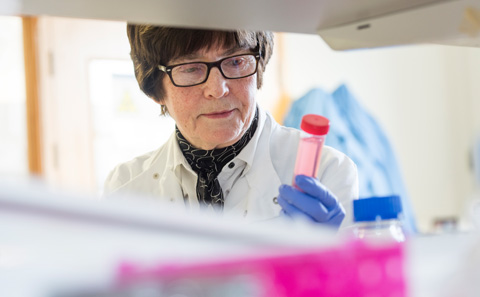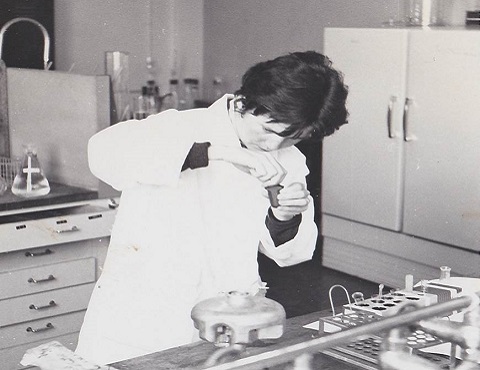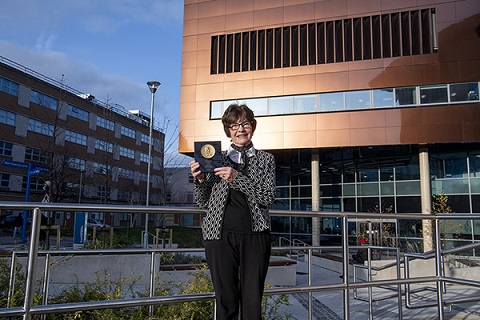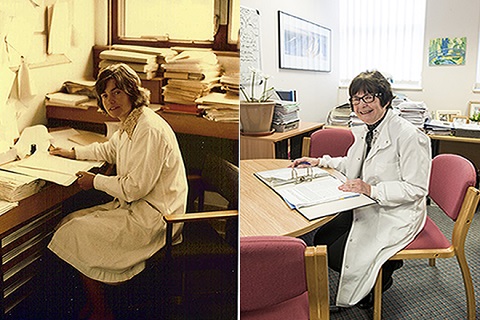Southampton Professor celebrated after distinguished career at the forefront of cancer immunology

Cancer researchers from the University of Southampton have come together to celebrate the achievements of Professor Freda Stevenson, who has retired after a career in cancer research of more than 50 years.
Professor Stevenson first joined Southampton in 1970 and established the Tenovus Research Laboratory, alongside Professor George Stevenson. Her main research area focused on the immunobiology of B-cell diseases, with a particular focus on the immunoglobulin (Ig) receptor that is expressed at the cell surface on B-cells. Professor Stevenson was the first to design genetic vaccines to target this molecule, and these approaches are now deployed internationally across a range of tumours.
She also focused on the analysis of the genetics of this receptor, providing seminal insights into the classification of leukaemia and lymphoma using this approach. One of her papers, published in Blood in 1999 has now been cited more than 2,500 times. It describes how Ig gene status can classify patients with chronic lymphocytic leukaemia (CLL) into two major subsets each with very different clinical behaviour.
This work is the foundation of the current treatment paradigm for CLL and influences international approaches to clinical diagnostics and therapy.

Professor Stevenson spend some time in the NHS from 1980, at the Regional Immunology Centre in Southampton, which was founded to bring haematology-based science into the health service. There, she was able to create her own research team before returning to the University and being made a Professor in 1997.
“I stayed in Southampton because we watched over the creation and growth of research into lymphoid tumors which culminated in the building of the Centre of Cancer Immunology,” she explained. “Southampton now has a national and international reputation for cancer immunology of which we can all be proud.”
“The rate of progress in the field has been dramatic and I have remained part of it, with personal achievements, as well as contributions to REF and to research impact. With support from the University, I have been fortunate in having a slow handover of my involvement to others, especially Professor Francesco Forconi, and I remain as an advisor even after retirement.”
Over the years, her work has been recognised by several international research and clinical bodies, clearly demonstrating the value the global community places on Freda’s work. In 2014, the European Haematology Association awarded Freda the ‘Jean Bernard Life Time Achievement Award’ for contributions to the advancement of haematology. A year later, she was awarded the Rai-Binet Medal by the International Workshop on CLL. In 2018, Professor Stevenson was awarded the Henry M Stratton Medal by The American Society of Hematology for her pioneering work on the biology of B-cell malignancies. In 2020, she was awarded a LifeTime Achievement Award by the British Society of Haematology.

Colleagues across Cancer Sciences at the University of Southampton have paid tribute to Professor Stevenson’s dedication to the field of cancer immunology.
Professor Francesco Forconi worked with Professor Stevenson on a number of studies and is now leading her lab. He said: “Freda’s contribution to the field of cancer immunology is widely celebrated and respected throughout the world. For me, on a personal level, she has inspired and guided me throughout the early stages of my research career and beyond. Freda taught me before time that studying the antigen-receptor and how it functions would explain how tumour cells exploit our body and how I should precisely treat B cell cancers. Her pioneering vision is now applied in [my] current clinical practice and, as a mature haematologist, I can prescribe targeted chemotherapy-free interventions, that can eradicate those B cell cancers, to all my patients. Her work, fostered by rigorous independent thinking, has heavily influenced my scientific views and that of my group to grow.
“I will carry on developing her founding studies on how lymphoma cells programme their environmental interactions for growth and survival, so that we will offer novel diagnostic, prognostic and therapeutic approaches in the most common lymphomas to that international scientific and clinical community to which Freda has successfully exposed us for many years. I take great pride in continuing her work at the University of Southampton.”
Professor Diana Eccles, Dean of the Faculty of Medicine at the University of Southampton, said: “Freda has been an inspirational and influential force in Southampton’s history of discovery science. Her major contributions to the study of cancer immunology have substantially altered our understanding of haematological malignancies and contributed to fundamental therapeutic advances. She has inspired many generations of scientists working in her lab as PhD students, post docs and colleagues and her influence and reach has been recognised internationally by the award of a number of prestigious prizes.”
Professor Jon Strefford, Head of Cancer Sciences in the Faculty of Medicine, said: “As the current Head of School of the School of Cancer Sciences (CS), I look forward to celebrating Professor Freda Stevenson’s career. Freda has had a truly remarkable academic career, with significant scientific and clinical impact, transforming our understanding of the most common form of leukaemia, and our approaches to its treatment.
“CS is enormously grateful to Freda for all she has contributed. Our school is currently in a strong position, with world-class academics leading internationally competitive research programmes, research that has benefited cancer patients. This strong position is, in no small part, built on the work that Freda did, delivered through her exceptional skill and ability that ultimately helped develop CS as a world-leader in the area of cancer immunology. Congratulations to Professor Stevenson for all her wonderful academic achievements.’

Professor Martin Glennie, now retired from the University, joined Professor Stevenson’s Southampton lab as a PhD student. He said: “Throughout her long and distinguished career Freda Stevenson has made Southampton Cancer Sciences a centre of international excellence for B-cell biology and shown how mechanistic understanding of cellular processes leads to advances in patient treatments. She was the first person to show me, as a fresh faced PhD student, how rigorous laboratory experimentation was needed to test ideas and could lead to better understanding.”
Professor Peter Johnson added: “When I was thinking about coming to Southampton in 1998, cancer immunology was a long way from the mainstream of cancer research in the UK. But I had seen the fascinating work that Freda was doing on the lymphoma idiotype, and I knew this would be the ideal place to develop research at the interface between the laboratory and the clinic. Freda epitomises scientific rigour and complete commitment to the team around her, and she was instrumental in bringing both ideas and people to Southampton, through her international network of collaborators and admirers. Whenever I tell people I do cancer research in Southampton they ask after Freda: such is her profile. I am not sure how I am going to tell them she has retired.”
During her retirement, Professor Stevenson will be involved in international grant committees and with the top hematology journal, Blood.